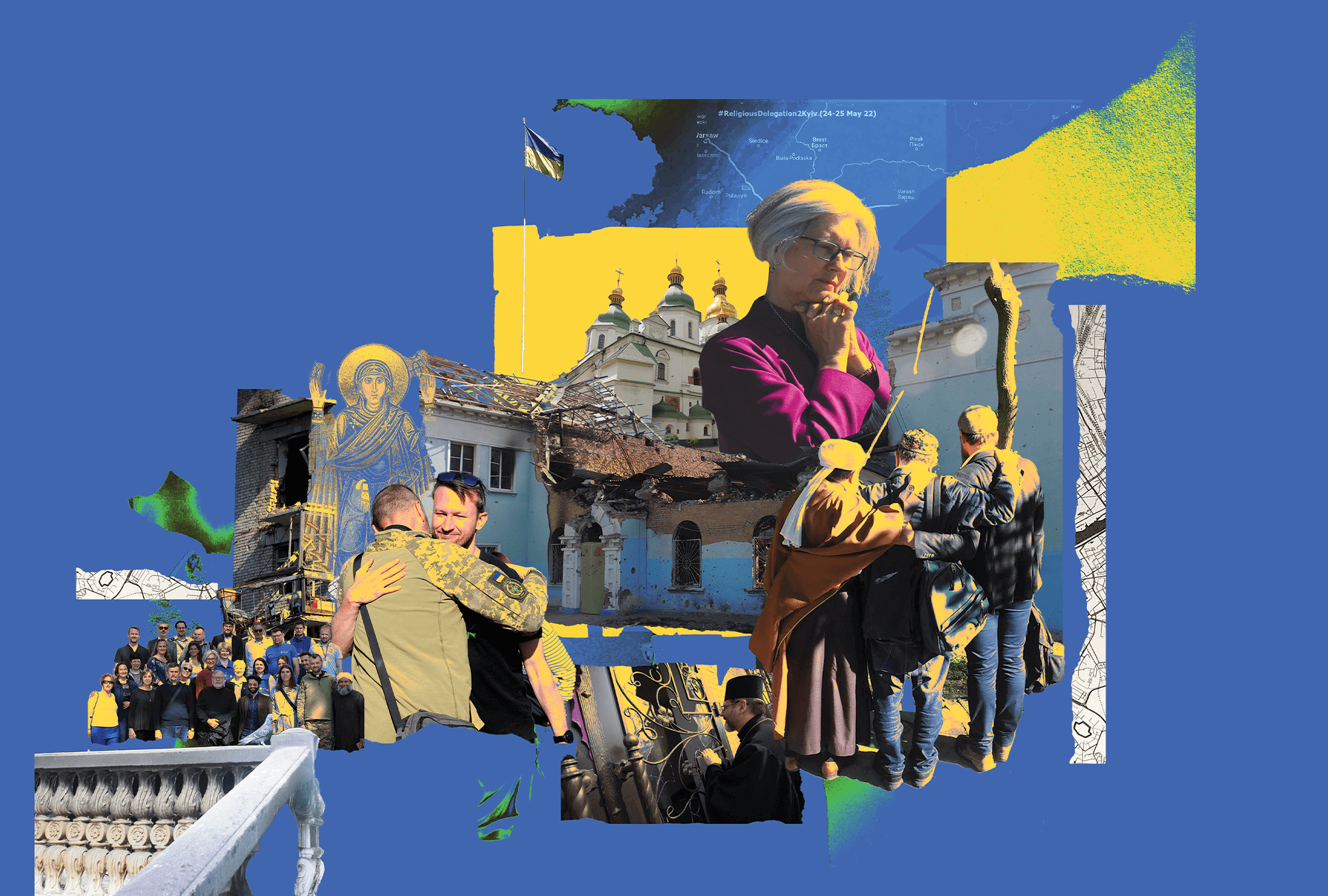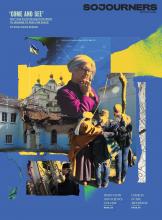Share As A Gift
Share a paywall-free link to this article.
This feature is only available for subscribers.
Start your subscription for as low as $4.95. Already a subscriber?

Photographs by Dawid Gospodarek / Photo collages by Candace Sanders
WHEN THE FRONT DESK clerk at the Ibis hotel in downtown Kyiv heard a large travel party entering the lobby, she glanced up in surprise. It was 20 minutes before the 11 p.m. military curfew. Our delegation of 17 international religious leaders had made hotel reservations in the war zone a few days in advance, but few—including the hotel clerk—thought we would make it over the border from Warsaw, Poland, to Kyiv, Ukraine, a city that six weeks earlier was surrounded by Russian military forces.
I smiled at the clerk. American soul singer Sam Cooke’s sweet tenor filled the lobby while we sorted bags and room keys.
I was born by the river in a little tent
Oh and just like the river I’ve been running ever since
After a 14-hour bus ride on a recently demined highway, here we were.
The streets of Ukraine’s bustling capital city of 4 million, divided east to west by the Dnieper River, were relatively quiet. More than 2 million of Kyiv’s inhabitants fled to border countries in February 2022 when Russia’s President Vladimir Putin launched missile attacks on more than half a dozen Ukrainian cities, including the capital.
Within hours of the air strikes, Russian tanks rolled across Ukraine’s borders, amphibious forces landed on the southern coast from the Black Sea, and Ukrainian government internet infrastructure, including the defense ministry, came under a severe cyberattack. The second-largest country in Europe was under a full-scale invasion.
In the five months following the attack, more than 10,000 (a vast undercount) Ukrainian civilians have been reportedly killed or injured, including more than 800 children. The war has displaced nearly half the country’s population, internally or externally.
NINE DAYS AFTER the invasion began, Kyiv’s mayor, Vitali Klitschko, with his brother, Wladimir, dropped a short video on social media inviting religious leaders to come to Kyiv to show their solidarity with the Ukrainian people.
“I express an appeal to the world’s spiritual leaders to take a stand and assume the moral function that is incumbent upon them, and to proudly assume the responsibility of their religions for peace ... Let us make Kyiv the capital of humanity, spirituality, and peace,” said Wladimir Klitschko, who often speaks in English for his brother. “Unity is our key for freedom,” concluded the mayor.
When our delegation arrived in May, we were the first to answer the mayor’s invitation. Our group of peace pilgrims from Italy, the U.K., Poland, and the United States included high-ranking clerics from Jewish, Christian, and Muslim traditions as well as leaders from faith-based civil society organizations such as Operazione Colomba, the nonviolent peace corps of the Pope John XXIII Community in Italy.
Both of the Klitschko brothers are former world heavyweight boxing champions. Vitali rose to political prominence during the Maidan popular uprising (the “Revolution of Dignity”). For 88 days beginning in November 2013, protesters engaged in nonviolent mass mobilization and a wide array of nonviolent strategies in response to then-President Viktor Yanukovych’s failure to sign popular political and economic agreements between Ukraine and the European Union, opting instead for a deal with Putin. Then five days of violent government crackdown left at least four police and 49 protesters dead, according to evidence released in the Maidan massacre trials. Vitali Klitschko (“Dr. Ironfist”) helped negotiate a peaceful end to the crisis.
The appeal to make Kyiv “the capital of humanity, spirituality, and peace” is rooted in Kyiv’s history. Situated on ancient maritime trade routes, the city prides itself on a rich cultural diversity. Most Ukrainians hold fiercely to the vision of a multicultural Ukraine rooted in freedom secured by democratic principles. Western politicians undercut this vision when they assume Ukrainians want to be like Americans. Russian politicians use Western politicians’ remarks to inflame culture wars within Russia against the “deceitful and decadent West led by the United States,” as Reuters framed it. Mayor Klitschko’s appeal was not so much to “make” Kyiv a capital of peace, but to defend and preserve its hard-won history of unity in diversity.

Got something to say about what you're reading? We value your feedback!